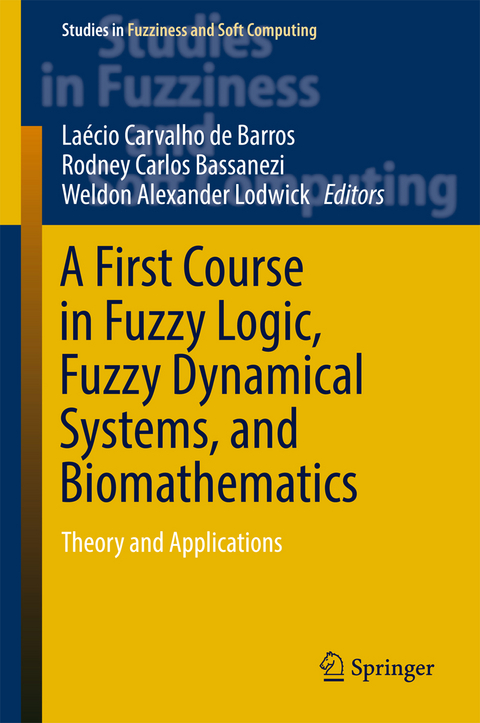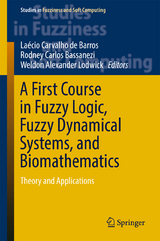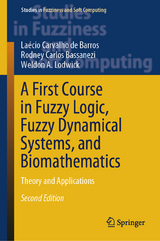A First Course in Fuzzy Logic, Fuzzy Dynamical Systems, and Biomathematics
Springer Berlin (Verlag)
978-3-662-53322-2 (ISBN)
- Titel erscheint in neuer Auflage
- Artikel merken
Laécio Carvalho de Barros is a Professor of Applied Mathematics at the Institute of Mathematics, Statistics and Computational Sciences, the University of Campinas, and holds a Ph.D. degree in Applied Mathematics from the University of Campinas, São Paulo, Brazil, in 1997. He is co-author of Fuzzy Logic in Action: Applications in Epidemiology and Beyond, Studies in Fuzziness and Soft Computing Vol. 232, 2008, Springer-Verlag Berlin Heidelberg, and of Fuzzy Differential Equations in Various Approaches, SpringerBriefs in Mathematics, Number 1, 2015, Springer International Publishing. His current research interests include modeling of biological phenomena, fuzzy sets theory and fuzzy dynamical systems. Moreover, he has taught fuzzy mathematical modeling and fuzzy set theory classes for over fifteen years to both undergraduate and graduate students. Rodney Carlos Bassanezi"serif"; mso-ansi-language:EN-US" is a Professor emeritus of Applied Mathematics at the Institute of Mathematics, Statistics and Computational Sciences at the University of Campinas starting his university teaching career there in 1969. He received a Ph.D. degree in mathematics from the University of Campinas in 1977. He held postdoctoral and research positions at the Libera Universitad di Trento, Italy 1981, 1985, 1990 and 1993. His research activities cover mathematical analysis (minimal surfaces), biomathematics, and fuzzy dynamical systems. He has published some books in Portuguese, notably one textbook on differential equations (1988), one textbook on mathematical modeling (2002), as well as an introduction to calculus and applications (2015). He has been the president of the Sociedade Latino-Americano de Biomatemática (1999-2001) and the coordinator of the graduate program in mathematics at the Federal University ABC in São Paulo. He has directed 55 Masters and 21 Ph.D. theses and his students have been teaching throughout Latin American. Weldon Alexander Lodwick is a Professor of Mathematics at the University of Colorado Denver. He holds a Ph.D. degree in mathematics (1980) from Oregon State University, He is the co-editor of the book Fuzzy Optimization: Recent Developments and Applications, Studies in Fuzziness and Soft Computing Vol. 254, Springer-Verlag Berlin Heidelberg, 2010, and the author of the monograph Interval and Fuzzy Analysis: A Unified Approach in Advances in Imaging and Electronic Physics, Vol. 148, pp. 76-192, Elsevier, 2007. His current research interests include interval analysis, distance geometry, as well as flexible and generalized uncertainty optimization. Over the last thirty years he has taught applied mathematical modeling classes to undergraduate and graduate students on topics such as radiation therapy of tumor, fuzzy and possibilistic optimization modeling, molecular distance geometry problems, and neural networks applied to control problems.
Fuzzy Sets Theory and Uncertainty in Mathematical Modeling.- The Extension Principle of Zadeh and Fuzzy Numbers.- Fuzzy Relations.- Notions of Fuzzy Logic.- Fuzzy Rule-Based Systems.
"The book serves as a sound and balanced exposure to the subject of fuzzy sets by bringing the fundamentals of this technology and presenting their applications to dynamic systems. ... the book serves as a timely introduction to the discipline of fuzzy sets and fuzzy modeling and can be recommended to everybody interested in fuzzy sets and a way in which they could be used in solving practical modeling problems." (Witold Pedrycz, zbMATH 1373.03005, 2017)
| Erscheinungsdatum | 08.10.2016 |
|---|---|
| Reihe/Serie | Studies in Fuzziness and Soft Computing |
| Zusatzinfo | XVI, 299 p. 113 illus., 15 illus. in color. |
| Verlagsort | Berlin |
| Sprache | englisch |
| Maße | 155 x 235 mm |
| Themenwelt | Informatik ► Theorie / Studium ► Künstliche Intelligenz / Robotik |
| Informatik ► Weitere Themen ► Bioinformatik | |
| Mathematik / Informatik ► Mathematik | |
| Technik | |
| Schlagworte | Artificial Intelligence • Bayesian inference • Computational Intelligence • Engineering • Epidemiology and medical statistics • Flexibility Modeling • fuzzy approximation • Fuzzy controllers • Fuzzy Expected Value • Fuzzy Logic Textbook • Fuzzy Random Variables • Fuzzy Relational Equations • Interval Operations • Lotka-Volterra Equations • Mathematical and Computational Biology • Maths for scientists • population dynamics • Possibilistic Non-Interactivity • Predator-Prey Model P-Fuzzy Model • Probabilistic Independence • probability and statistics • Statistics for Life Sciences, Medicine, Health Sci • Uncertainty Modeling • Zadeh's Extension Principle • Zadeh’s Extension Principle |
| ISBN-10 | 3-662-53322-7 / 3662533227 |
| ISBN-13 | 978-3-662-53322-2 / 9783662533222 |
| Zustand | Neuware |
| Haben Sie eine Frage zum Produkt? |
aus dem Bereich





